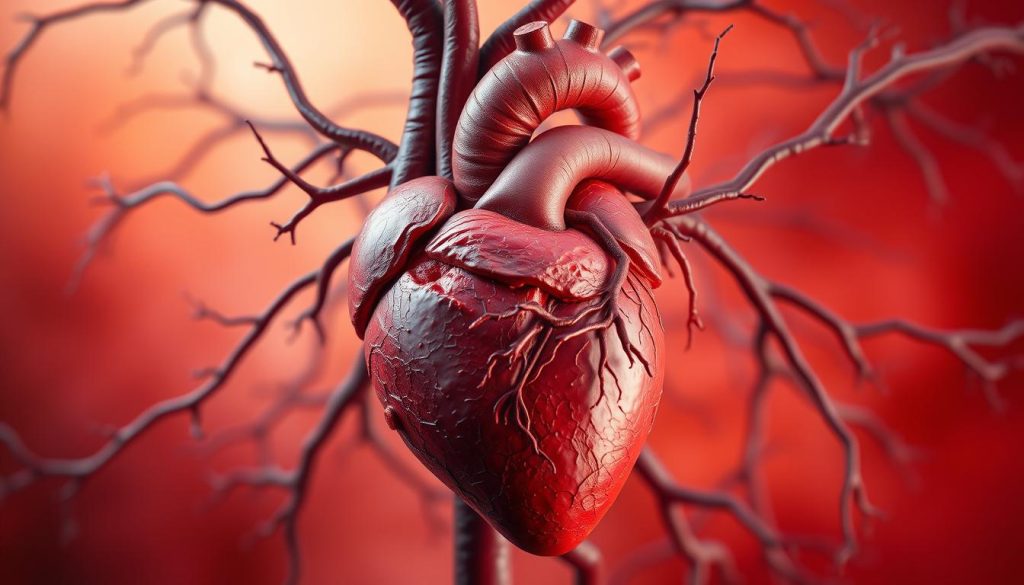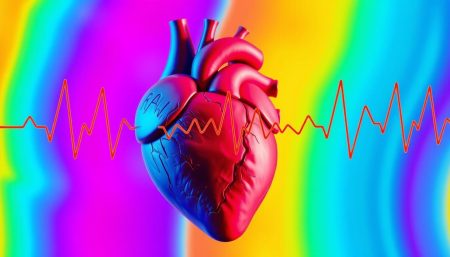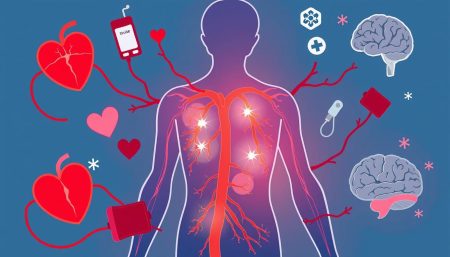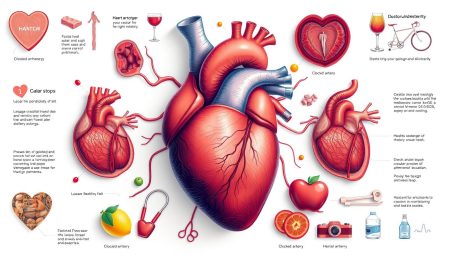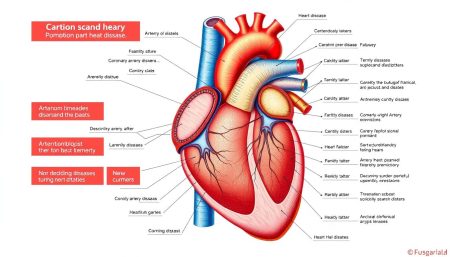Atherosclerotic cardiovascular disease is a serious health issue affecting millions in the U.S. This guide will dive into what it is. It happens when plaque builds up in your arteries. We’ll look at the causes, symptoms, and how it affects your heart.
We’ll cover everything from the early signs to possible complications. This guide is for you if you’re worried about your risk or want to improve your heart health. It’s packed with useful information to help you manage your cardiovascular health.
What Is Atherosclerotic Cardiovascular Disease: Understanding the Basics
Atherosclerotic cardiovascular disease is a silent threat to heart health. It involves the buildup of fatty deposits, known as atherosclerotic plaque, in the walls of arteries. This process narrows blood vessels and reduces blood flow to vital organs.
The Role of Plaque Formation in Blood Vessels
Plaque formation starts when cholesterol and other substances accumulate in artery walls. Over time, these deposits harden and narrow the arteries. This restricts blood flow and oxygen supply to the heart, brain, and other organs.
How Atherosclerosis Develops Over Time
Atherosclerosis is a gradual process that often starts in childhood. As we age, lifestyle factors like poor diet, lack of exercise, and smoking can accelerate plaque buildup. This slow progression makes early detection challenging but vital for prevention.
Impact on Overall Cardiovascular Health
The effects of atherosclerosis extend beyond the heart. It can lead to various cardiovascular conditions, including coronary artery disease. This occurs when plaque narrows the arteries supplying blood to the heart, increasing the risk of heart attacks and other serious complications.
“Understanding atherosclerosis is the first step in protecting your heart. Knowledge empowers you to make heart-healthy choices every day.”
By recognizing the basics of atherosclerotic cardiovascular disease, we can take proactive steps to maintain heart health and prevent its progression. Regular check-ups and lifestyle modifications play key roles in managing this condition effectively.
Common Types of Atherosclerotic Disease
Atherosclerotic disease can affect different parts of the body, causing various health problems. Let’s look at three main types that are big risks for heart health.
Coronary Artery Disease Explained
Coronary artery disease happens when plaque builds up in the heart’s arteries. This makes blood flow narrow, leading to chest pain or heart attacks. Smoking, high cholesterol, and diabetes are risk factors.
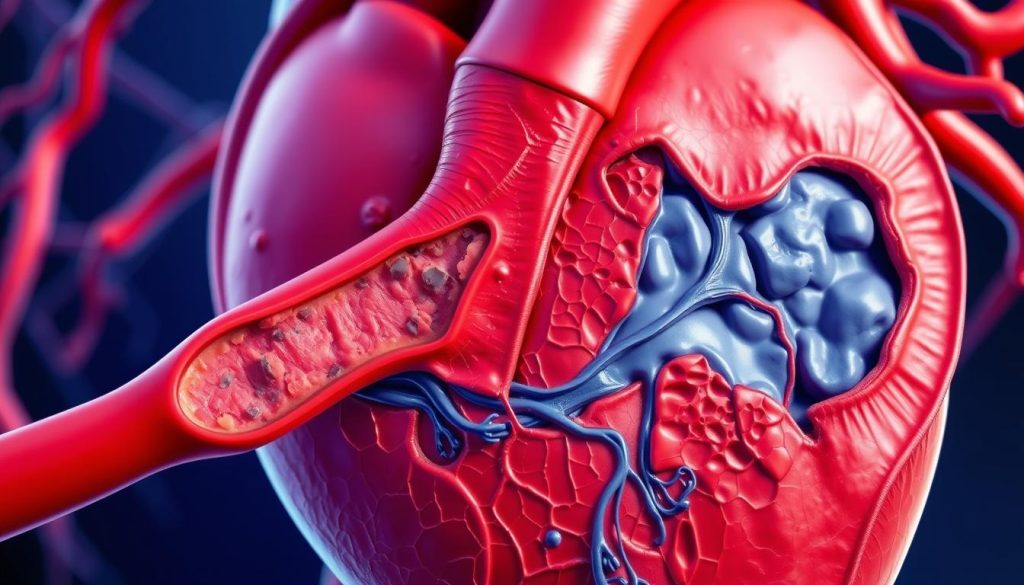
Peripheral Arterial Disease Overview
Peripheral artery disease affects blood vessels outside the heart and brain. It mainly hits the legs, causing pain when walking. Smokers and those with high blood pressure are at higher risk. Catching it early is key for managing it well.
Carotid Artery Disease and Stroke Risk
Carotid artery disease is when plaque builds up in neck arteries that supply blood to the brain. It greatly increases the risk of stroke. Symptoms include sudden weakness, speech issues, or vision problems.
| Disease Type | Primary Location | Key Symptoms | Major Risks |
|---|---|---|---|
| Coronary Artery Disease | Heart arteries | Chest pain, shortness of breath | Heart attack |
| Peripheral Artery Disease | Leg arteries | Leg pain when walking | Limb ischemia |
| Carotid Artery Disease | Neck arteries | Often asymptomatic | Stroke |
Knowing about these atherosclerotic diseases is key to spotting symptoms early. Getting medical help quickly can greatly improve your health and life quality.
Key Risk Factors for Developing Atherosclerosis
Knowing what increases your risk of atherosclerosis is key to preventing it. These factors can make you more likely to get this serious heart disease.
Lifestyle choices are big players in getting atherosclerosis. Smoking, not moving enough, and eating badly are major culprits. Eating too much saturated fat and cholesterol can clog your arteries. But, exercising regularly and eating well can help prevent it. Learn more about preventing atherosclerosis.
Medical conditions also raise your risk. High blood pressure, diabetes, and being overweight can harm your arteries. This makes them more likely to get clogged.
Age and family history are things you can’t change. Getting older increases your risk. If your family has atherosclerosis, you might be at higher risk too.
| Modifiable Risk Factors | Non-Modifiable Risk Factors |
|---|---|
| Smoking | Age |
| Lack of exercise | Family history |
| Poor diet | Gender (men at higher risk) |
| High blood pressure | Ethnicity |
| Diabetes | |
| Obesity |
By changing things you can, like your diet and exercise, you can lower your risk. Regular health checks and catching problems early are important for your heart health. Just like how spotting breast cancer symptoms early is key.
Early Warning Signs and Symptoms
It’s important to know the signs of atherosclerosis to catch atherosclerotic cardiovascular disease early. Spotting these symptoms can help you get the right treatment on time. Here are the symptoms you should watch out for.
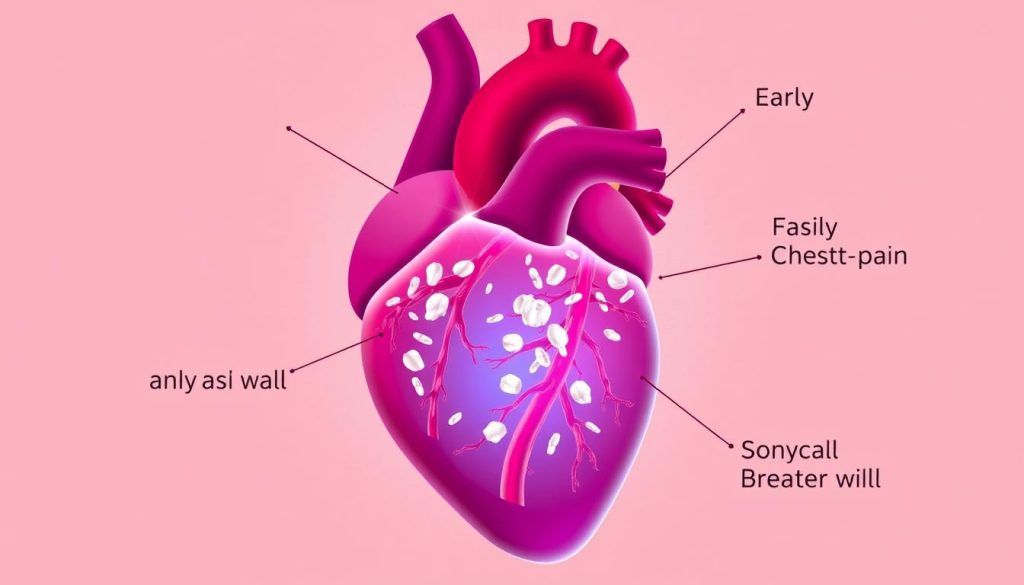
Physical Symptoms to Watch For
Atherosclerosis often starts without any obvious signs. But, there are some physical clues you might notice:
- Chest pain or pressure (angina)
- Shortness of breath
- Leg pain or cramping during exercise
- Numbness or weakness in limbs
- Difficulty speaking or slurred speech
Emergency Warning Signs
Some symptoms need urgent medical help:
- Sudden, severe chest pain
- Unexplained arm or jaw pain
- Sudden weakness or numbness on one side of the body
- Severe headache with no known cause
- Loss of consciousness
Silent Symptoms and Hidden Dangers
Atherosclerotic cardiovascular disease can hide without symptoms. Some people might not feel anything until it’s too late. It’s key to get regular check-ups, if you have risk factors like high blood pressure or high cholesterol.
“Atherosclerosis is often called a ‘silent killer’ because many people don’t know they have it until it’s advanced.”
By being aware of these symptoms, you can take steps to keep your heart healthy.
Diagnostic Methods and Testing Procedures
Doctors use many tools to find atherosclerotic cardiovascular disease. They look for atherosclerosis causes and how much plaque is in blood vessels.
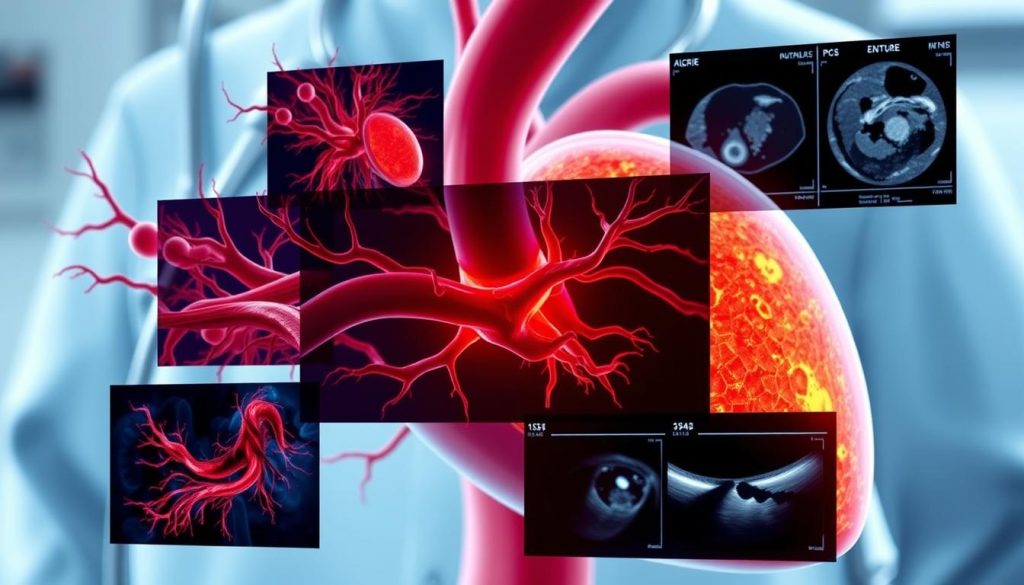
- Ultrasound: Uses sound waves to create images of arteries
- CT scans: Provide detailed cross-sectional views of blood vessels
- MRI: Offers high-resolution images of arteries and plaque
Blood tests also play a big role. They check cholesterol, blood sugar, and inflammation. These tests help doctors decide on treatment and track the disease.
For a closer look, doctors might suggest invasive tests. Angiography uses dye and X-rays to show narrowed or blocked arteries.
Stress tests check how the heart works when you’re active. They can find problems that don’t show up when you’re resting. This helps diagnose coronary artery disease.
“Early diagnosis of atherosclerosis is key to preventing serious cardiovascular events. Regular check-ups and appropriate testing can save lives.”
Knowing about these tests helps patients take care of their heart health. Regular screenings and talking to doctors are important for managing atherosclerosis.
Treatment Options and Medical Interventions
Treating atherosclerosis involves a mix of methods to manage the condition and stop it from getting worse. Doctors create treatment plans based on each patient’s specific needs. They consider how severe the disease is and the patient’s overall health.
Medication-Based Treatments
Medicines are key in treating atherosclerosis. Statins help lower cholesterol levels. Antiplatelet drugs prevent blood clots. Some patients might also need medications to control blood pressure or diabetes.
| Medication Type | Purpose | Common Examples |
|---|---|---|
| Statins | Lower cholesterol | Atorvastatin, Simvastatin |
| Antiplatelet drugs | Prevent blood clots | Aspirin, Clopidogrel |
| Blood pressure medications | Control hypertension | ACE inhibitors, Beta-blockers |
Surgical Procedures and Interventions
In serious cases, surgery might be needed. Angioplasty opens blocked arteries. Bypass surgery creates new paths for blood flow. These surgeries can greatly improve blood flow and lessen symptoms.
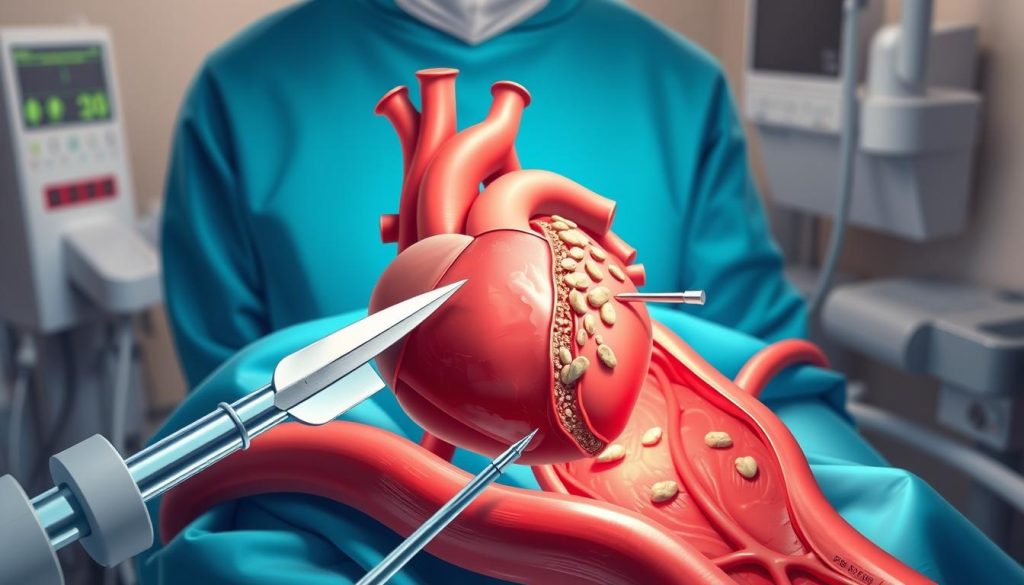
Lifestyle Modification Approaches
Changing your lifestyle is vital for preventing and treating atherosclerosis. Eating a heart-healthy diet, exercising regularly, and quitting smoking can slow the disease’s progress. These actions also boost your heart health.
- Eat a Mediterranean-style diet full of fruits, vegetables, and whole grains
- Do at least 150 minutes of moderate-intensity aerobic activity each week
- Keep a healthy weight through balanced eating and regular exercise
- Manage stress with relaxation techniques or mindfulness
Combining medicines, surgeries when needed, and lifestyle changes can help manage atherosclerosis. Regular check-ups and sticking to treatment plans are essential for long-term success in managing this condition.
Prevention Strategies and Lifestyle Changes
Preventing atherosclerosis is key to keeping your heart healthy. By tackling major risk factors, you can lower your risk of getting this condition.

Eating right is essential. Eat lots of fruits, veggies, whole grains, and lean meats. Cut down on bad fats and cholesterol. Also, aim for 150 minutes of moderate exercise weekly to keep your heart strong.
Quitting smoking is a big step. Smoking greatly increases your risk of atherosclerosis. If you’re trying to quit, talk to your doctor for help.
Stress management is also important. Try meditation, yoga, or deep breathing to reduce stress. High stress can lead to inflammation and high blood pressure, both bad for your heart.
| Lifestyle Change | Impact on Atherosclerosis Risk |
|---|---|
| Heart-healthy diet | Reduces cholesterol buildup |
| Regular exercise | Improves blood flow and heart health |
| Quitting smoking | Decreases inflammation and vessel damage |
| Stress management | Lowers blood pressure and inflammation |
Don’t forget to get regular health checks. These help track risk factors like blood pressure and cholesterol. Catching and managing these early can stop atherosclerosis from getting worse.
Living with Atherosclerotic Disease
Living with atherosclerotic cardiovascular disease can be tough. But, with the right care, many people lead fulfilling lives. It’s important to know about the disease and how to manage it for better health.
Daily Management Tips
Managing atherosclerosis daily is essential. This means taking your medicines, eating right, and staying active. Your doctor will guide you on what activities are safe. Stress-reducing activities like meditation or yoga can also help.
Long-term Outlook and Prognosis
The outlook for atherosclerotic disease depends on how severe it is and how well you follow treatment. With the right treatment and lifestyle changes, many see their heart health improve. Regular check-ups help track progress and adjust treatment plans.
Support Systems and Resources
You don’t have to face atherosclerotic cardiovascular disease alone. Support groups offer emotional support and advice. The American Heart Association provides educational resources and tools for patients and families.
FAQ
Q: What is atherosclerotic cardiovascular disease?
A: Atherosclerotic cardiovascular disease is when plaque builds up in arteries. This makes blood vessels narrow and harden. It can harm the heart, brain, and limbs, leading to serious health issues.
Q: What are the main causes of atherosclerosis?
A: High cholesterol, high blood pressure, and smoking are big causes. Obesity, diabetes, and a bad diet also play a part. Genetics and age add to the risk.
Q: What are the common symptoms of atherosclerotic cardiovascular disease?
A: Symptoms vary but often include chest pain and shortness of breath. Fatigue and leg pain when walking are common too. Sometimes, there are no symptoms until a serious event happens.
Q: How is atherosclerotic cardiovascular disease diagnosed?
A: Doctors use physical exams, blood tests, and imaging studies to diagnose. Tools like ECGs and ultrasounds are used. Your doctor will choose the best tests based on your symptoms and risk factors.
Q: What are the treatment options for atherosclerosis?
A: Treatment includes medicines and lifestyle changes. This can include diet changes and exercise. Surgery might be needed in severe cases. The treatment plan depends on the disease’s severity and the affected arteries.
Q: Can atherosclerosis be prevented?
A: While some risks can’t be changed, many can be managed. Eating well, exercising, and not smoking help. Managing blood pressure and diabetes also helps prevent it.
Q: What is the difference between coronary artery disease and peripheral artery disease?
A: Coronary artery disease affects the heart’s blood supply, leading to heart attacks. Peripheral artery disease affects the legs, causing pain during activity. Both are types of atherosclerosis but affect different areas.
Q: How does carotid artery disease increase stroke risk?
A: Carotid artery disease narrows the arteries to the brain. This can reduce blood flow or cause clots. If a clot blocks blood flow, it can cause a stroke by cutting off oxygen and nutrients to the brain.
Q: What lifestyle changes are most effective in managing atherosclerotic cardiovascular disease?
A: Eating a heart-healthy diet and exercising regularly are key. Maintaining a healthy weight, quitting smoking, and managing stress also help. These changes can greatly reduce the risk and progression of atherosclerosis.
Q: What is atherosclerotic plaque, and how does it form?
A: Atherosclerotic plaque is a buildup of fatty deposits and cholesterol in arteries. It forms over time due to accumulated substances. High cholesterol, inflammation, and artery damage contribute to its formation.












